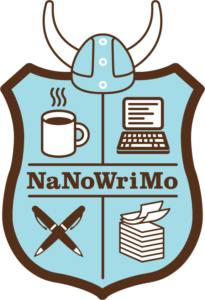 If you’ve hung around me for any length of time, you know I adore National Novel Writing Month. For those not familiar with this insanity, it’s sort of an Iron Man of writing. Participants try to churn out a 50,000-word novel during the crazy-busy month of November. (A guy who didn’t have to orchestrate Thanksgiving dinner decided on the November time frame, but that’s another story.) I don’t always participate, but I always want to!
If you’ve hung around me for any length of time, you know I adore National Novel Writing Month. For those not familiar with this insanity, it’s sort of an Iron Man of writing. Participants try to churn out a 50,000-word novel during the crazy-busy month of November. (A guy who didn’t have to orchestrate Thanksgiving dinner decided on the November time frame, but that’s another story.) I don’t always participate, but I always want to!
If you haven’t tried it, here are three good reasons to consider it.
- It’s fun. In our achievement-oriented society, it’s refreshing to participate in something that’s more about the process than the product. Most of the words written will never see daylight—most of mine are total junk—but it always amazes and delights me to see what my imagination comes up with when allowed to play.
- It’s cheap therapy. I wrote my second NaNo project the year I was struggling with depression and suicidal thoughts. It did not cure me. Not even close. But it gave me something to do, something to think about, something to reach for. I doubt the book will ever be published, but it was one of many things that helped me survive a tough season.
- It can help you grow as a writer. Among other things, I’ve learned how to write a lot more quickly through my NaNo practice books. I didn’t realize just how valuable this productivity was until my freelance writing business (finally) started to pick this year. Thanks to NaNo, I’ve learned to crank out a not-completely-terrible first draft in an hour or less. The more I can write, the more I can earn. Win-Win. NaNoWriMo is also good for building confidence, stretching creative muscles, and encouraging a more disciplined writing life.
And the #1 best reason NOT to do NaNoWriMo?
 You. Just. Don’t. Want. To.
You. Just. Don’t. Want. To.
If it doesn’t sound enjoyable and helpful to you, it probably won’t be. Some writers find the whole process guilt-inducing, demotivating, stressful, and just plain frustrating. Less than 20% of the people who sign up go on to write 50,000 words. NaNo is a great fit for me, but it’s a complete waste of time and energy for many talented, committed writers I know.
So try it, or don’t. Do what fits you best and don’t let anyone make you feel guilty, either way. But whatever you choose, I hope you’ll find ways to stay connected to your writing and honor your creativity during this busy season.



